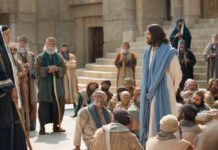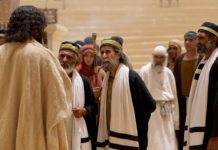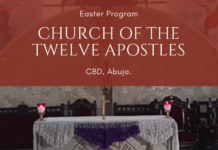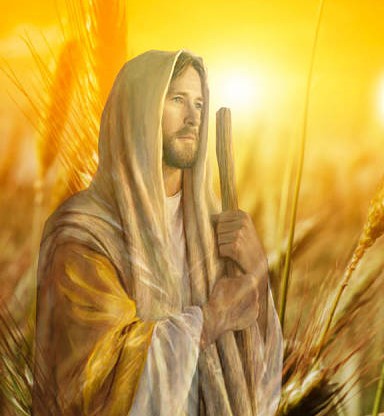Theme of the Sunday: God’s Patience and Our Impatience. We instinctively divide ourselves into good and evil, friends and enemies. The consequence of such a distinction is in tolerance and a desire to solve immediately whatever tensions arise from them. Some ask God to intervene and judge and punish others. The readings‘ today tell us that God does not do things like that. The first reading, teaches us that he uses his power not to punish us, but to save us; he wants all of us to do likewise. The gospel tells us to accept with peace of mind the presence of evil in the world, and invites us to recognise the weeds in our own hearts. It assures us that the love of God will one day destroy it. The second reading speaks of the Spirit that prays for us, beseeching the Father to destroy all evil. This prayer will certainly be heard.
Entrance Antiphon Ps53:6.8
See, I have God for my help. The Lord sustains my soul. I will sacrifice to you with willing heart, and praise your name, O Lord, for it is good.
Collect
Show favour, O Lord, to your servants, and mercifully increase the gifts of your grace, that made fervent in hope, faith and charity, they may be ever watchful in keeping your commands. Through our Lord…
FIRST READING
“You give repentance for sins.”
A reading from the Book of Wisdom (Wisdom12:13.16-l9)
There is no god besides you, whose care is for all men, to whom you should prove that you have not judged unjustly; for your strength is the source of righteousness, and your sovereignty over all causes you to spare all. For you show your strength when men doubt the completeness of your power, and rebuke any insolence among those who know it. You who are sovereign in strength judge with mildness, and with great forbearance you govern us; for you have power to act whenever you choose. Through such works you have taught your people that the righteous man must be kind, and you have filled your sons with good hope, because you give repentance for sins.
The word of the Lord.
RESPONSORIAL PSALM Psalm86:5-6.9-10.15-16a(R.5a)
R/. O Lord, you are good and forgiving.
O Lord, you are good and forgiving,
full of mercy to all who call to you.
Give ear, O Lord, to my prayer,
And attend to my voice in supplication. R.
All the nations you have made shall come;
they will bow down before you,
O Lord, and glorify your name,
For you are great and do marvellous deeds,
you who alone are God. R.
But you, O God, are compassionate and gracious,
slow to anger, O Lord,
abundantin mercy and fidelity;
turn and take pity on me. R.
SECOND READING
“The Spirit himself intercedes for us with sighs too deep forwords. ”
A reading from the Letter of Saint Paul to the Romans (Romans 8:26-27)
Brethren: The Spirit helps us in our weakness; for we do not know how to pray as we ought, but the Spirit himself intercedes for us with sighs too deep for words. And he who searches the hearts of men knows what is the mind of the Spirit, because the Spirit intercedes for the saints according to the will of God.
The word of the Lord.
ALLELUIA Matthew 11:25
Alleluia. Blessed are you, Father, Lord of heaven and earth, that you have revealed to little ones the mysteries of the kingdom. Alleluia.
GOSPEL
“Let both grow together until the harvest.”
A reading from the holy Gospel according to Matthew (Matthew 13:24-43)
*At that time: Jesus put another parable before the crowds, saying, “The kingdom of heaven may be compared to a man who sowed good seed in his field; but while men were sleeping, his enemy came and sowed weeds among the wheat, and went away. So when the plants came up and bore grain, then the weeds appeared also. “And the servants of the householder came and said to him, ‘Sir, did you not sow good seed in your field? How then has it weeds?’ He said to them, ‘An enemy has done this.’ The servants said to him, ‘Then do you want us to go and gather them?’ But he said, ‘No; lest in gathering the weeds you root up the wheat along with them. Let both grow together until the harvest; and at harvest time I will tell the reapers, Gather the weeds first and bind them in bundles to be burned, but gather the wheat into my barn. ”’ * Another parable he put before them, saying, “The kingdom of heaven is like a grain of mustard seed which a man took and sowed in his field; it is the smallest of all seeds, but when it has grown it is the greatest of shrubs and becomes a tree, so that the birds of the air come and make nests in its branches.” He told them another parable. “The kingdom of heaven is like leaven which a woman took and hid in three measures of meal, till it was all leavened.” All this Jesus said to the crowds in parables; indeed he said nothing to them without a parable. This was to fulfil what was spoken by the prophet: “I will open my mouth in parables, I will utter what has been hidden since the foundation of the world.” Then he left the crowds and went into the house. And his disciples came to him, saying, “Explain to us the parable of the weeds of the field.” He answered, “He who sows the good seed is the Son of man; the field is the world, and the good seed means the sons of the kingdom; the weeds are the sons of the evil one, and the enemy who sowed them is the devil; the harvest is the close of the age, and the reapers are angels. Just as the weeds are gathered and burned with fire, so will it be at the close of the age. The Son of man will send his angels, and they will gather out of his kingdom all causes of sin and all evildoers, and throw them into the furnace of fire, where there will be weeping and gnashing of teeth. Then the righteous will shine like the sun in the kingdom of their Father. He who has ears, let him hear.”
The Gospel of the Lord.*
Today’s Reflection
Again, Jesus makes use of the parables of the weeds, the mustard seed and yeast to get across to his audience the lessons of the kingdom. For him, it is the result of the constant battle between good and evil forces that is inherent in individuals and institutions. The kingdom of God will triumph only when we allow our positive intentions and choices to gradually override our negative intentions. God deals patiently with his children and therefore will be able to sort out the various contradictory situations that surround us. From the parable of the mustard seed we learn that small beginnings often lead to great endings! Though it started as a small community, the church is meant to grow and provide shade for all peoples, cultures and nations of the world. It is also expected to be like dough capable of positively influencing and transforming society. The second reading highlights the role of the Holy Spirit of God in transforming individuals so that they in turn will world towards the transformation of the world.














